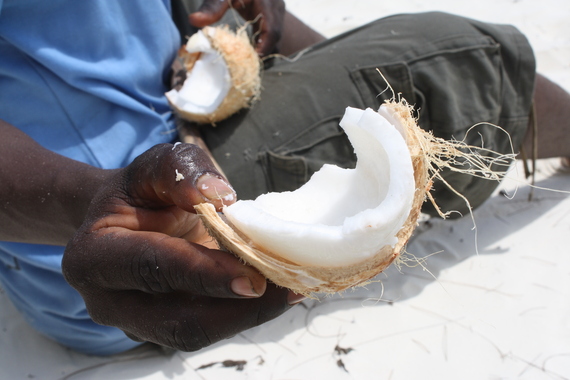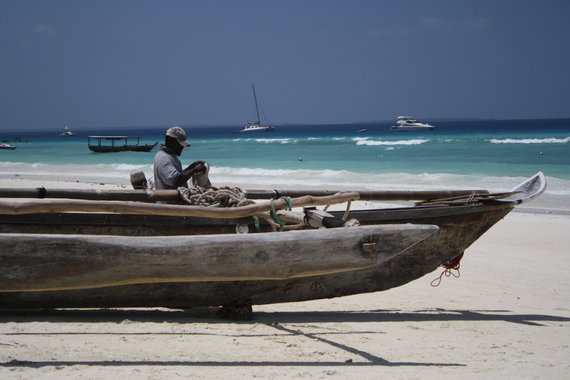It seems that often in the places where the people have the least, they give the most. And, often, it appears to be the opposite in places of abundance. Why is the scarcity mentality in the "West" and not here, where electricity spontaneously shuts off, internet wains, income and education aren't a guarantee?
Sitting on a beach, I'm handed a coconut, to the statement "sharing is caring, rafiki." And my social conditioning makes me for a split-second stop and think what this person might want in return.
The answer shows itself: nothing. Absolutely nothing. But they're happy with that smile and a "thank you" I give anyway.
Later, the same person who shared a coconut stops to share a story, and his dinner, hand-prepared by his grandmother. We eat sloppily with our hands and laugh at cultural differences. This is a pattern for the full week I stay in Paje on the East coast of Zanzibar.
Another part of the island now- Nungwi in the North. I settle in to my new room and am greeted with smiles by a local and member of the staff, Mansour. Another great conversation. A sharing of stories. An offer for a tour of the village and fruit shopping. I happily accept.
Walking in the heat of the African sun, I'm told about life in the village. I see the school, the shops, children playing, goats picking through the trash, skinny cows - the side that tourists wouldn't likely see. My new friend graciously invites me to see his newly-built home and asks for advice on how to decorate. He would take advice from a "total stranger."
Time ticks and I'm late for a meeting. No worry. He calls a taxi for me - won't accept me paying for it. Insists it's his fault I am late. Later, when I return to my room, a big brown bag full of fruit awaits me - watermelon, mango, bananas, pineapple. Why? Because we didn't have time to purchase any fruit while we were out.
Generous.
Now, I have friends back home. Amazing people. They would do such things for me. They love me deeply and I love them. To us, a bag of fruit is money well spent if it puts a smile on a valued friend's face. These are people I've known for years- we've shared meals and many smiles. But, is this how we treat people we barely know?
In Tanzania, generosity spills over abundantly to new acquaintances. And, I wonder...how would our own socieities change if we adopted this way of behaving? What if we gave more than we took; if we calculated less; thought about loss or even money less. What if a coconut could be offered to a "rafiki"( a new friend) without that split-second inner voice questioning "why?"
Maybe there's something we can learn from Tanzania. When we have less, we can give more. Smile more. When we have more, we can give more. Smile more.
The end product is always a smile - and maybe even a new rafiki. I think that's a pretty good way to be.
Original blog here.


